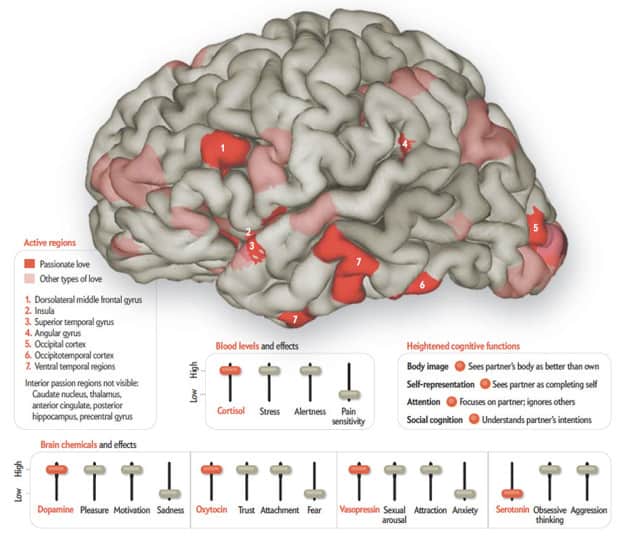
The heart is generally understood to be the symbol of love, but if you want to be more accurate, you better start looking for a brain-shaped chocolate box for your Valentine.
That's because the brain is where all the chemical processes occur that give you the feelings of falling in, staying in and falling out of love.
An infographic from Scientific American shows a dozen separate areas of the brain where the neurotransmissions and chemical processes take place that lead to feelings of passionate, maternal and unconditional love. These chemicals each have specific jobs to do at different stages of love.
An article published in the Journal of Neurophysiology said "early-stage romantic love is a developed form of a mammalian drive to pursue preferred mates."� So when you start to develop a crush, your brain releases a chemical called dopamine, which is often associated with feelings of euphoria, motivation and energy. The areas in the brain working during these early romantic processes also happen to be the areas activated while using drugs like cocaine, which explains "the strength of the obsession." That's why the initial pursuit of a new love interest can feel so good and exciting, which keeps us coming back for more.
Adrenaline, norepinephrine and epinephrine are the chemicals that will keep us excited and feeling good about continuing a relationship, according to Fusion. They make us "addicted" and give us the feeling of being in love. All the while, dopamine continues to give us the feelings of euphoria.
Long-term attachment is caused by a chemical called oxytocin, which according to Scientific American is "crucial to how we form and maintain romantic relationships." Oxytocin can make people more sympathetic and supportive, and couples with high levels of oxytocin have better communication and fewer stress hormones. Researchers said oxytocin was "more involved in the communication component of love between couples than the romantic component of love." So while other chemicals might keep a relationship exciting, oxytocin makes it long-lasting.
But of course, sometimes love doesn't last that long.
A bad breakup can hurt. The same places in the brain related to the feelings of rejection and heartbreak are also related to physical pain. This means because the pain of a nasty separation really does hurt physically, you can take aspirin to get over it, according to a study reported on by New York Magazine. The study focused on individuals dealing with rejection and showed the people "who were on the painkiller reported a significant reduction in their daily hurt feelings."
So even if your special someone can make your heart beat faster by walking in the room, the feelings you have about him or her don't originate there.
Instead of telling your Valentine you love him or her from the bottom of your heart, say that you love them from your dorsolateral middle frontal gyrus. Is that romantic or what?


